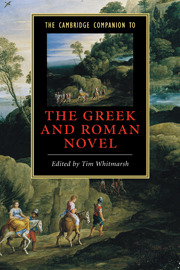1 - Introduction
Published online by Cambridge University Press: 28 June 2008
Summary
Denounced through the nineteenth and much of the twentieth century for its triviality, smuttiness, and pastiche (to say nothing of intimations of 'oriental' influence), the Greco-Roman novel began to find in the late years of the last century a much more enthusiastic audience. Perhaps better than any other ancient form, the novel embodies the spirit of (post-)modernity; of a prosaic world, politically and ethically complex beyond compare yet questing after simple truths, pluralist yet hierarchical, riven by global homogenisation. Art, literature, music, dance and film have all drawn inspiration from these texts. The worlds of scholarship and teaching have been similarly energised: across the world university programmes, conferences, organisations, websites and publications testify to the vitality of novel studies. The Cambridge Companion to the Greek and Roman Novel offers eighteen new essays by internationally distinguished experts in the field of Greek and Roman narrative fiction. It seeks to provide students, scholars and the interested public with a sophisticated yet accessible point of entry into these beguiling texts. It is not designed as a general survey: although it is aimed at readers new to the novels as well as those with more familiarity, the Companion has no text-by-text discussions, and indeed no single agenda. Rather it consists of a series of state-of-the art provocations, interlocking in overall design but written from a range of intellectual positions. Taken together, these essays represent both the culmination of the latest thinking on the novel and a stimulus to future exploration.
- Type
- Chapter
- Information
- The Cambridge Companion to the Greek and Roman Novel , pp. 1 - 14Publisher: Cambridge University PressPrint publication year: 2008

